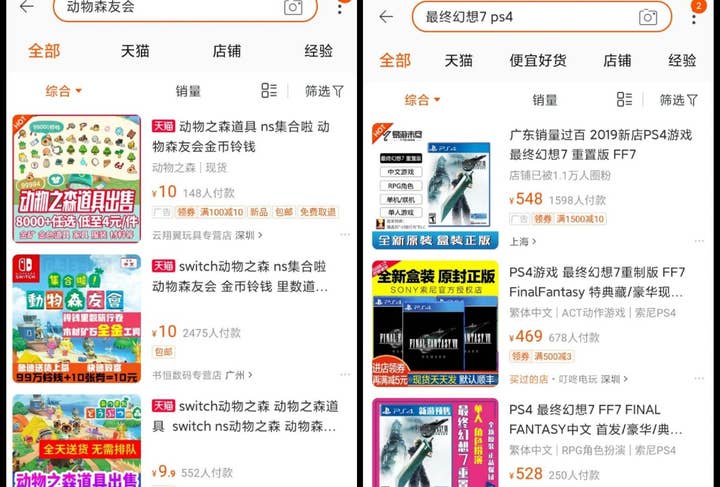The curious case of Animal Crossing in China | Opinion
China plays a bigger role in console sales than people think, says Apptutti's Daniel Camilo, and Nintendo's game is compelling proof
Animal Crossing: New Horizons has been a huge hit in China. On Wechat, China's all-encompassing super app, it would be safe to assume that nine out of ten people had at least one friend sharing screenshots from the game in their social gallery. At its peak -- somewhere during the two weeks following its March 20 release date -- it seemed like everyone and their cousins knew about the game in China. And then, a few days ago, radio silence settled instead.
How the media keeps misreading China
I'm not writing to talk about the recent Animal Crossing ban in China. Yes, as many international media outlets reported, the game has been removed from Taobao, the de-facto national e-commerce platform for everything in China, and mentions of the game on social media have virtually disappeared. The reason for that? Gamers have exploited its settings to import pictures into their virtual worlds, including a lot of politically sensitive content. The government eventually took notice and, predictably, the game is now shrouded by the "let's pretend it never happened and don't mention it again" blanket.
At its peak, it seemed like everyone and their cousins knew about Animal Crossing in China
While the ban is not my focus here, I do want to point out that many international outlets have misrepresented how events actually unfolded. While most are running headlines about "dissident" content related to Hong Kong being the main reason, the earlier red-flags in fact came about due to the "inappropriate" representation of political figureheads from mainland China -- the Communist Party of China and its chairman in particular -- satirical use of government slogans, and parody related to the COVID-19 outbreak and the lockdown measures implemented in the country.
If anything, the vast majority of Chinese gamers protesting in-game about Hong-Kong were/are in Hong-Kong, and not mainland China. They became noticeable considerably later than the previous examples I mentioned.
A huge hit, but can anyone claim its success?
Before all the controversy surrounding the game exploded, I was already fascinated with Animal Crossing in China for one simple reason: sales.
The Nintendo Switch is officially available in China. However, less than a handful of Switch games have been officially released in the country, both physical and digitally -- the situation is complex, and I wrote about it here, and here before. That, however, doesn't prevent the console and many of its games from selling very well in China, because most of the hardware and physical copies of games are imported versions that anyone can easily buy from Taobao and other platforms.
My question is: who is taking credit for these sales in China? Yes, I already answered this by mentioning most sales are from imported versions, but it's worth diving a little deeper. Let's say Animal Crossing has sold one million units in China since release (not an unrealistic estimate, I believe) -- 100% of these copies, both digital from the eshop and physical, are not Chinese by origin. Most are either Japanese or Hong-Kong/Asia/Taiwan editions. There are a lot of residual PAL copies reaching China as well, and from other markets.
Console market dynamics -- it's not what you think
Taobao permeates people's lives in China on a scale that simply can't be compared to any other e-commerce platform on the planet
It's important for people to understand the market dynamics in "urban China" today when it comes to game's availability, and sales for consoles in particular. First of all, forget about retail. The old stories of "grey markets" in China are by now as outdated as that leather jacket you've been wearing since college. Games are sold online, period. And I mean physical copies as well.
Second, there are no "big stores" or "representatives" that consumers flock into. Taobao exists and permeates people's lives in China on a scale that simply can't be compared to any other e-commerce platform on the planet -- not even Amazon. It's as simple as looking up the game you want on the app, browsing through the many results from many different stores that may have it in stock -- stores with no physical presence, for the most part -- and purchasing.
The process can be as quick as 20 seconds from initial research to purchase, and delivery can happen the same day if you happen to order during the morning from a store located in the same city. This applies to virtually any product you can think of, and not just games. If we're talking about groceries or cooked meals, then the delivery time is reduced to 30 minutes or less, in most cases.

Thirdly, "imported" doesn't necessarily means "slow" and "difficult", as it does in most other territories where the idea of importing games from other markets feels like too much of a headache to even be considered by most consumers. In China, all physical game sales come from dozens or hundreds of different online stores -- "located" on Taobao -- that import the games the moment they become available. More often than not, a lot of these stores have the games in stock to send out on the day of their official release elsewhere, if not even sooner. The fact that games are "imported" is mostly irrelevant for Chinese consumers.
China is the Planet X of game sales
Both developers and publishers are mostly unaware of how important China can be for some of their games
Bear with me, please. Just like the unverified-but-almost-sure-to-be-there-object affecting the orbit of celestial bodies in the far borders of our Solar System, China is continuously affecting sales from surrounding markets without anyone being able to step forward and acknowledge or verify those sales.
If Animal Crossing did sell one million copies in China, nobody is really talking about it, or claiming those sales. Logically, for imported Japanese copies, those sales would fall back into the books of companies in Japan. For copies from Hong-Kong, they would be registered in that territory, and so on -- or would they?
"Nintendo of China" can't officially claim Animal Crossing's sales for China, as the game is not officially released in the country. On the other hand, it would be disingenuous for Nintendo representatives from Hong Kong to say that sales of the HK version represents the actual sales in Hong Kong alone. Official data from Famitsu claimed the game sold almost two million copies in Japan in the three days following launch. But the fact is that a portion of those copies were in fact sold in China, and nobody seems to be able to say how many exactly.
The easy conclusion to this can of worms would be that always present "Others" portion of the pie-chart for worldwide console sales. The problem with including "China" in that ambiguous slot is that it undermines any realistic, objective and up-to-date analysis not only of gaming sales around the world, but most importantly how pervasive and influential China's context and role actually is.
A very direct consequence of this is that both developers and publishers are mostly unaware of how important China can be for some of their games, and are wrongfully assuming that Chinese gamers are oblivious to their creations. The effects of this on both a commercial and creative level are, in my opinion, still grossly understated, and undermine the industry in ways of which most of us are unaware.
Daniel Camilo lives in Shenzhen. He is the overseas business developer for Apptutti, a specialist in publishing games in China.
